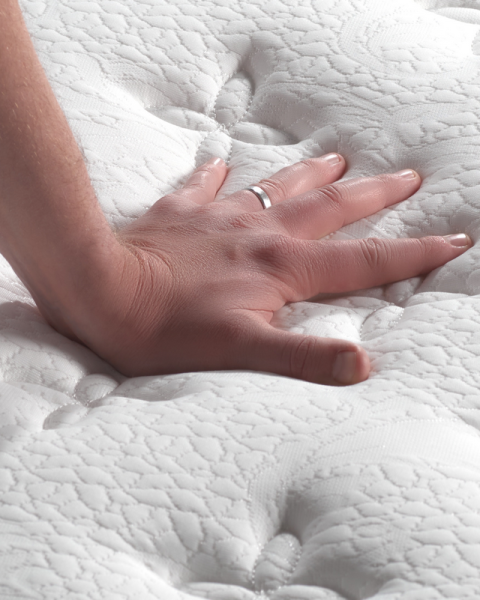Like almost everything else in your home, your mattress will need to be cleaned every so often. Regularly cleaning your bed can both extend its lifespan and prevent the build-up of dust mites, mould, bed bugs, and other allergens. Plus, you’re bound to sleep more soundly knowing your bed is fresh and clean.
If you’re unsure where to start, we’ll walk you through how to clean a mattress. With this step-by-step guide, your bed will look fresh as new in no time.
How to clean a mattress
First, make sure you have the right equipment. You will need a vacuum and the upholstery attachment that comes with it. Secondly, you’ll need baking soda, which will be used to deodorize the bed.
For mattress spills or accidents, there are specific materials and methods to treat these problems. However, for the purpose of this guide, we will focus on standard bed cleaning.
Vacuum the mattress
A quick vacuuming is the first step to cleaning a mattress. Vacuum the entire bed’s surface, even if it’s not visibly dirty.
The top of the mattress needs to be free of lint or grit before you start cleaning. Use your upholstery attachment to work out any stubborn dirt. Lastly, be sure to vacuum all the sides including the bottom of the mattress as well.
Spray an enzyme cleaner
An enzyme cleaner should remove stains from all types of materials, including your mattress. Spray it on a cloth and use this to wipe down the top, bottom, and sides of your mattress. The product will help kill dust mites that can cause allergies.
If you don’t have an enzyme cleaner on hand, a mild soap solution should do the trick. Using a spray bottle, moisten your cloth with the soap and wipe down your mattress in the same way you did with the enzyme cleaner. However, be careful to avoid applying too much liquid to the bed as excess moisture can lead to mould and mildew.
Dry off any moisture
Dry off all moisture on top of your mattress, whether it’s leftover water from the enzyme cleaner or any spilled fluids. Use an absorbent cloth to wipe away the water, and then let it dry completely. To help air out the bed, you can open the windows and put a fan near it.
Deodorize with baking soda
Baking soda has a natural deodorizing effect that will freshen up your mattress even further. Sprinkle it on the bed and let it sit for at least several hours before vacuum-cleaning again. If your bed is extra smelly, consider applying a second round for added freshness.
Put on a mattress protector
A mattress protector is a great way to make sure your bed stays clean. It will absorb any spills and stains on the bed, as well as protect your sheets from getting dirty when you sleep. The protector encases the entire bed and many are sealed with a zipper for easy removal.
Wash your other bedding
In addition to the mattress, you should maintain your other bedding items like sheets, pillows, comforters, and blankets. If you have any problems with allergies or asthma, consider washing your bedding in hot water to kill dust mites and other allergens before using it again.
Your sheets should be washed on a weekly basis, but the other items can be cleaned every so often. For example, the pillows and comforter only need to be cleaned about twice a year, while blankets can be washed every few months. However, if your skin directly touches the comforter or blankets, these should be washed more frequently.
Clean the bedframe
Keeping your bedframe clean can also help make sure your mattress doesn’t get dusty or dirty. Vacuum it regularly to prevent dust from accumulating, and wipe down any visible crumbs, dirt, or hair with a cloth. Be sure to also sweep underneath the bed; dust and dirt can easily accumulate in this area too.
How often should I clean my mattress?
Most experts suggest performing a deep clean on your mattress twice a year. If Spring cleaning is popular in your home, consider doing this once in the Spring and then again in the Fall. You could also try cleaning in Summer and Winter if you notice your allergies are worse at these times.
While once every six months is the recommended time frame, you can choose to wash your bed as often as you’d like. For those living with persistent allergies, more frequent mattress cleanings could be highly beneficial at keeping dust and other allergens away, allowing for a better night’s sleep.
Conclusion
Regularly cleaning your bed is an important task that can lead to better sleep and help extend the lifespan of your mattress. By following this detailed guide, you should be able to continue using your bed for years to come.




